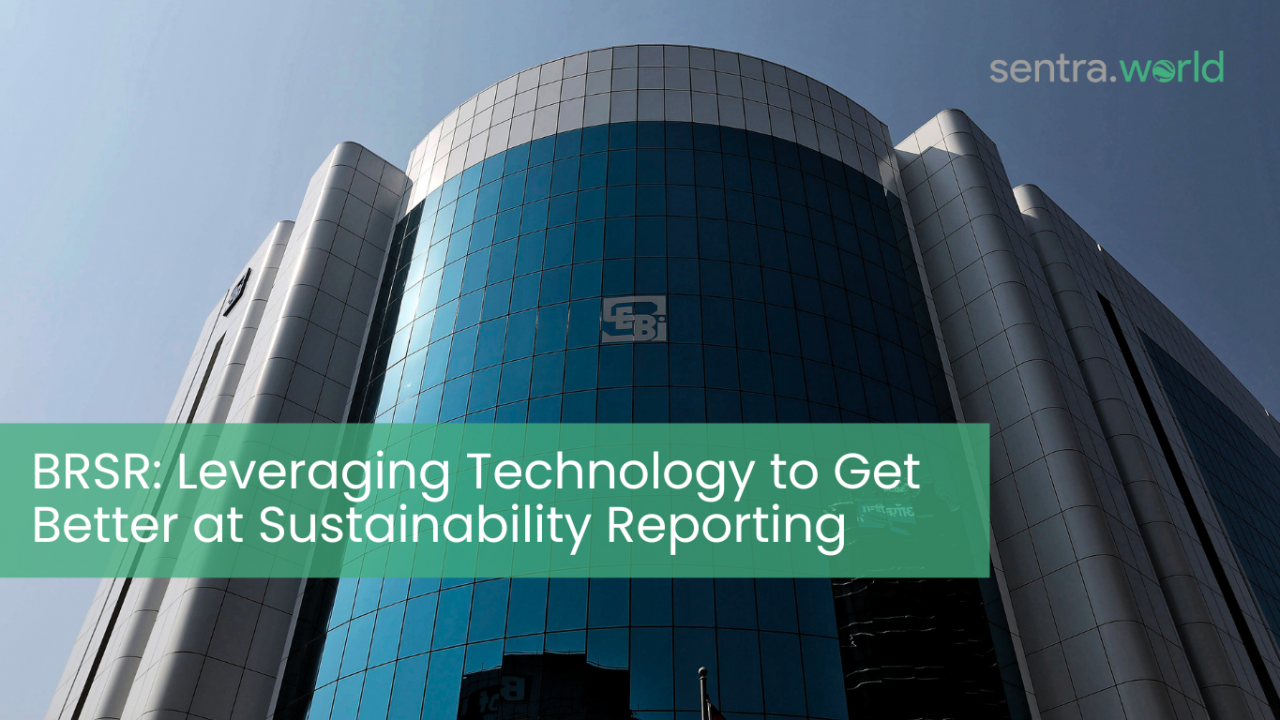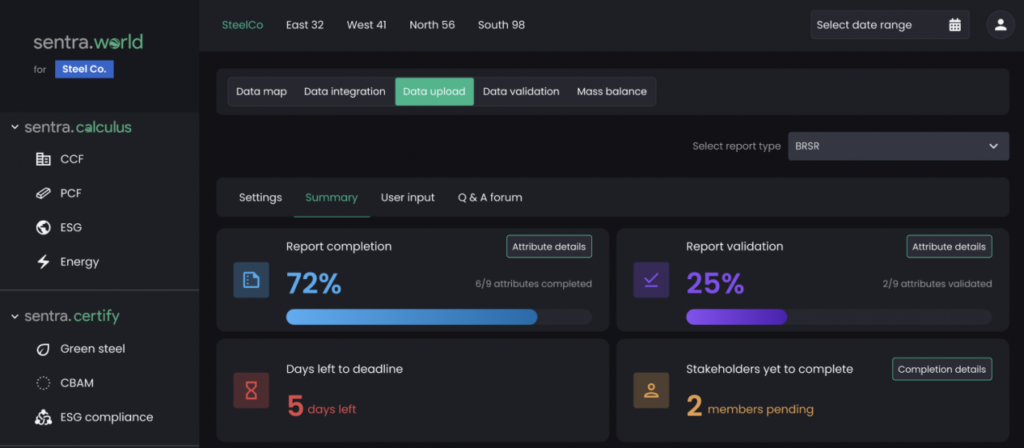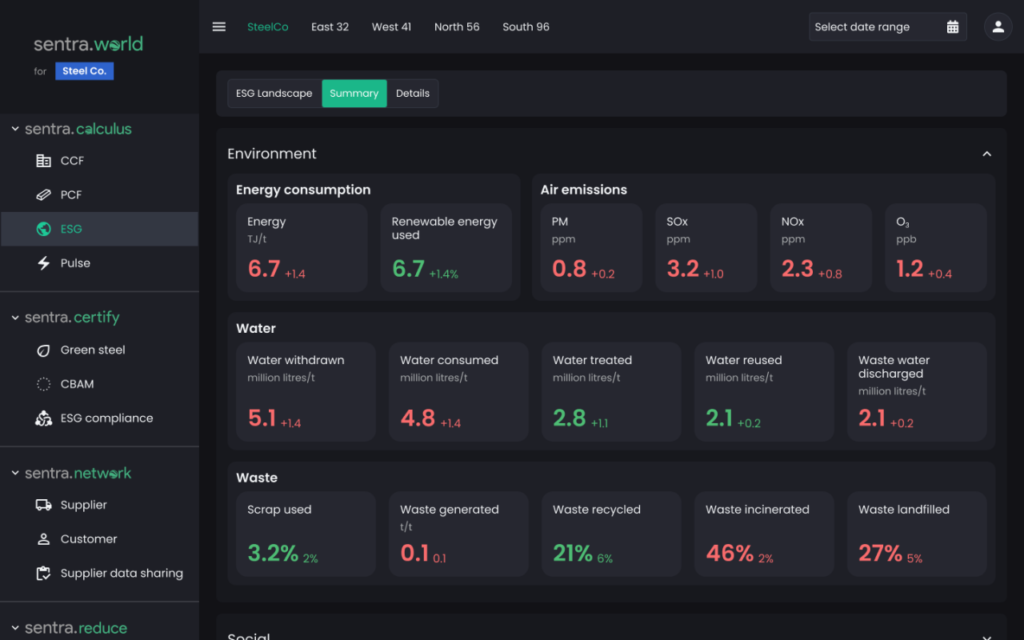- BRSR
BRSR: Leveraging Technology to Get Better at Sustainability Reporting

Efficient Data Collection: The Foundation of BRSR Reporting

Creation and Maintenance of Audit Trails: Enhancing Data Integrity
Ensuring data reliability is essential for meaningful BRSR reporting, and one of the best ways to do this is by maintaining robust audit trails. With an audit trail, every action related to data collection, processing, and reporting is recorded, providing a verifiable chain of custody. This transparency is vital, as it enables companies to identify any inconsistencies, omissions, or errors in their data.
Cloud-based platforms like sentra.world are highly effective for maintaining such audit trails. They log each interaction with the data—whether it’s data input, modification, or validation—creating an immutable record. For instance, if an energy consumption figure needs adjustment, the system will record the change and capture details such as the date, time, and person making the update. This not only strengthens data credibility but also simplifies internal audits, making compliance with BRSR standards less resource intensive.
Dashboarding and Data Visualization: Simplifying BRSR for Better Decision-Making
BRSR reporting demands not only data collection but also data analysis to draw actionable insights. Insightful dashboards like sentra.world’s ESG dashboard play an essential role in this process, enabling companies to visualize their sustainability metrics in a way that is easy to interpret. Instead of sifting through complex spreadsheets, dashboards provide decision-makers with a real-time overview of key sustainability indicators, such as carbon emissions, water usage, waste generation, and social impact metrics. For example, a company can use dashboards to compare the carbon emissions of different plants or assess water consumption by region. This level of detail allows businesses to not only monitor their current sustainability performance but also set realistic, data-backed targets.
Moreover, dashboards can automatically calculate key metrics needed for BRSR compliance, such as the ratio of renewable energy to total energy consumed, or water recycled versus total water usage. This automation saves time, reduces the chances of error, and helps teams remain compliant with the latest BRSR guidelines.
Benefits of Publishing Detailed Sustainability Reports
The advantages of publishing detailed BRSR-aligned sustainability reports extend beyond mere compliance. When companies are transparent about their ESG performance, they foster trust and strengthen their reputation among stakeholders, investors, and customers. Technology simplifies the production of these reports, offering various formatting and output options to align with BRSR guidelines.
1. Building Stakeholder Trust: Transparency in sustainability performance enhances credibility, showing stakeholders that the company is committed to socially responsible practices. This transparency can attract environmentally conscious consumers, encourage investor confidence, and boost employee morale. Investors, particularly, are showing increased interest in ESG factors, often favouring companies with robust sustainability policies. For companies seeking financing, a detailed BRSR report can prove beneficial, as investors increasingly factor ESG data into their decision-making processes.
2. Meeting Regulatory and Compliance Demands: SEBI’s BRSR framework is now mandatory for the top 1,000 listed companies in India, and it is likely to extend further as sustainability gains importance. With effective reporting solutions in place, companies can adapt quickly to changes in reporting standards. Such solutions ensure companies not only meet existing regulations but also prepare for future regulatory demands, whether from SEBI or other governing bodies.
3. Enhancing Operational Efficiency: Detailed BRSR reports can serve as a roadmap for sustainable business practices. By analysing sustainability data across operations, companies can pinpoint inefficiencies, such as high energy or water consumption in certain facilities and address these areas with corrective actions. This data-driven approach to sustainability not only reduces the environmental footprint but also enhances operational efficiency, ultimately leading to cost savings.

Conclusion
Technology is a powerful enabler for Indian companies working to meet BRSR reporting requirements. By streamlining data collection, ensuring audit trail accuracy, visualizing data through dashboards, and enabling comprehensive sustainability reporting, technology helps companies not only comply with BRSR but also benefit from their commitment to sustainable practices.
In a world increasingly driven by sustainability, the companies that embrace technology to enhance their BRSR reporting will be better positioned for long-term success. With better data accuracy, transparency, and efficiency, these organizations can foster trust among stakeholders, improve operational performance, and create meaningful change in the realm of responsible business practices. As BRSR reporting continues to evolve, Indian companies have a unique opportunity to leverage technology, turning compliance into a competitive advantage and leading the way toward a sustainable future.
